
Victor-Marie Hugo, vicomte Hugo, sometimes nicknamed the Ocean Man, was a French Romantic writer and politician. During a literary career that spanned more than sixty years, he wrote in a variety of genres and forms.

Eugène Rose de Beauharnais was a French nobleman, statesman, and military commander who served during the French Revolutionary Wars and the Napoleonic Wars. Through the second marriage of his mother, Joséphine de Beauharnais, he was the stepson of Napoleon Bonaparte. Under the French Empire he also became Napoleon's adopted son. He was Viceroy of the Kingdom of Italy under his stepfather, from 1805 to 1814, and commanded the Army of Italy during the Napoleonic Wars. Historians consider him one of Napoleon's most able relatives.
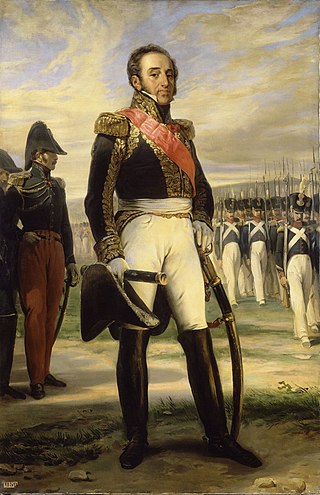
Louis-Gabriel Suchet, duc d'Albuféra, was a French Marshal of the Empire and one of the most successful commanders of the French Revolutionary and Napoleonic Wars. He is regarded as one of the greatest generals of the Napoleonic Wars.

Armand-Jacques Leroy de Saint-Arnaud was a French soldier and Marshal of France. He served as French Minister of War until the Crimean War when he became Commander-in-chief of the army of the East.
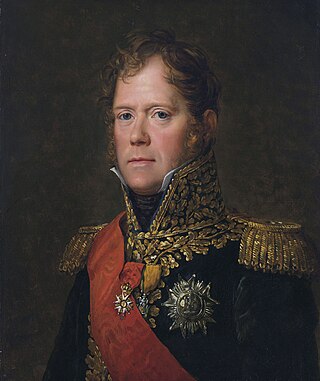
Michel Ney, 1st Prince de la Moskowa, 1st Duke of Elchingen was a French military commander and Marshal of the Empire who fought in the French Revolutionary Wars and the Napoleonic Wars.

Emmanuel de Grouchy, marquis de Grouchy was a French military leader who served during the French Revolutionary Wars and the Napoleonic Wars. He was the last Marshal of the Empire to be created by Napoleon, and is best known for his actions during the Waterloo campaign.

François Joseph Lefebvre, Duke of Danzig, was a French military commander of the French Revolutionary Wars and the Napoleonic Wars, and one of the original eighteen Marshals of the Empire created by Napoleon.

Claude François de Malet was born in Dole to an aristocratic family. He was executed by firing squad, six days after staging a failed republican coup d'état as Napoleon I returned from the disastrous Russian campaign in 1812.

Jean Maximilien Lamarque was a French general of the French Revolutionary Wars and the Napoleonic Wars who later became a member of the French Parliament. Lamarque served with distinction in many of Napoleon's campaigns. He was particularly noted for his capture of Capri from the British, and for his defeat of Royalist forces in the Vendée in 1815. The latter campaign received great praise from Napoleon, who said Lamarque had "performed wonders, and even surpassed my hopes".

Nicolas Joseph Maison, 1st Marquis of Maison was a French military officer who served in the French Revolutionary Wars, the Napoleonic Wars, and as commander of the Morea expedition during the Greek War of Independence. He was made a Marshal of France in 1829 and served as Minister of War from 1835 to 1836.

The coup d'état of 2 December 1851 was a self-coup staged by Louis-Napoléon Bonaparte, at the time President of France under the Second Republic. Code-named Operation Rubicon and timed to coincide with the anniversary of Napoleon I's coronation and victory at Austerlitz, the coup dissolved the National Assembly, granted dictatorial powers to the president and preceded the establishment of the Second French Empire a year later.
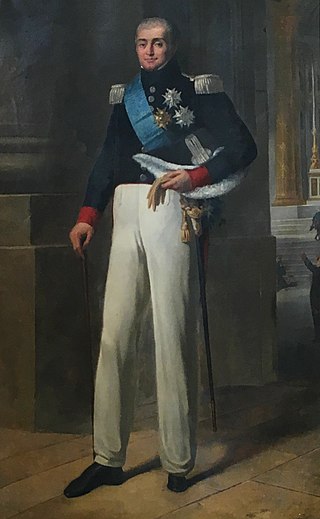
Marie-Victor-Nicolas de Faÿ, Marquis de La Tour-Maubourg was a French cavalry commander under France's Ancien Régime before rising to prominence during the First French Empire.

Jean Victor Tharreau or Jean Victor Thareau, was a General of Division in the Army of the French Empire.
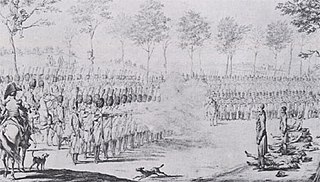
Emmanuel Maximilien-Joseph Guidal was a French general known for his role in the Malet Conspiracy which was aimed at toppling Napoleon I, who was away from Paris when the events of it occurred.
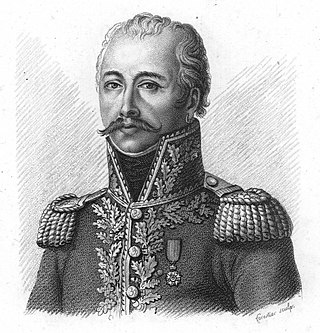
Antoine-Guillaume Maurailhac Delmas de La Coste Delmas was a French military officer who served in the French Revolutionary Wars and Napoleonic Wars. Delmas was killed at the Battle of Leipzig.
Jean-Baptiste Alexandre Baron de Strolz, sometimes written Stroltz,, was a French general during the Napoleonic Wars, and subsequently an important political figure.
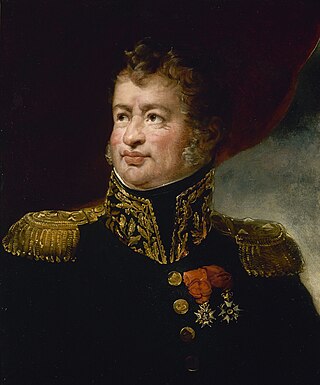
Joseph Léopold Sigisbert Hugo was a French general in the Napoleonic Wars. He was the husband of Sophie Trébuchet and the father of four sons. He is best known for his relationship to his third son, the eminent writer and French peer, Victor Hugo.
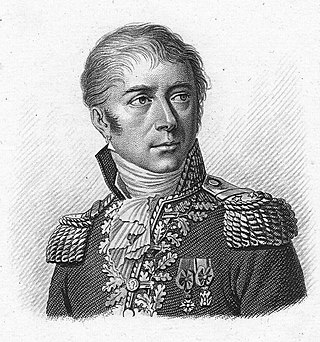
Honoré Vial was a French military leader, diplomat, and administrator who served in the French Revolutionary Wars and Napoleonic Wars.

Sophie Françoise Trébuchet was a French painter and the mother of Victor Hugo.

Abel Joseph Hugo was a French military officer, essayist, and historian. His younger brother was the novelist Victor Hugo.


















